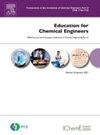Enhancing self-learning skills and quality through formative actions and feedback within chemistry classes in the laboratory – A useful model
Abstract
In here a novel method is described to improve student success rates in a first-year basic chemistry theoretical/practical hybrid course (n = 31 students) by implementing simple ways of formative assessment. This to reduce student dropout rates following the philosophy of encouraging students’ self-control. Essential is to train first-year bachelor students in their self-learning skills and to enhance their evaluative judgment. As a result, students are able to provide better quality of the assessment products at the end of the course. In practice the course is redesigned and intervention tools are integrated at multiple levels throughout the course. The lecturers’ role was adapted to a coaching role, thereby introducing low-effort personalized micro-interventions to meet the personalized needs of students. To clarify these learning needs for students, awareness of the quality desired for the final assessment products is important. Awareness was improved by providing examples of varying quality and introducing multiple peer- and self-assessment moments during the course. The final evaluation of the course examination products showed that the quality of the laboratory notebook was substantially higher after following this approach. Additionally students learned other important skills such as self-learning skills, collaborating in practical work and giving and receiving feedback. Unexpectedly, the high perceived lecturers’ workload decreased. The work presented here provides a novel approach in the form of a model and a practical blueprint with tools for a practical chemistry course design which develops students’ self-learning skills thereby substantially improving student success rates. In our example course, the ultimate student success rate increased form 83 % to 95 % after using this novel approach.

 求助内容:
求助内容: 应助结果提醒方式:
应助结果提醒方式:


